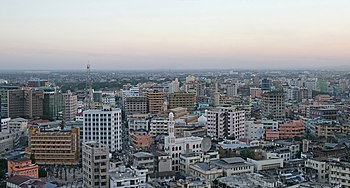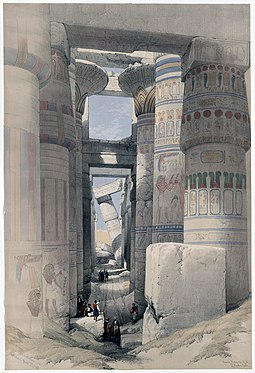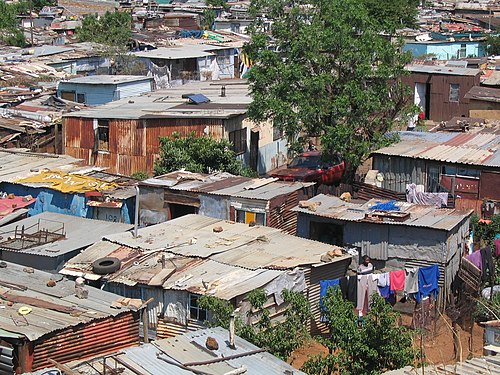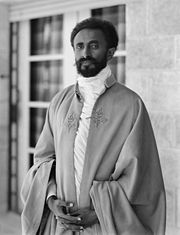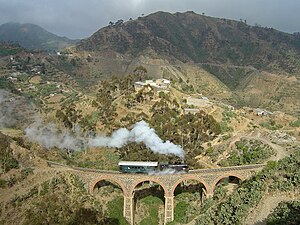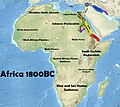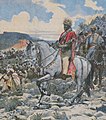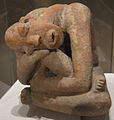Portal:Africa



Africa is the world's second largest and second-most populous continent after Asia. At about 30.3 million km2 (11.7 million square miles) including adjacent islands, it covers 20% of Earth's land area and 6% of its total surface area. With 1.4 billion people0 as of 2021, it accounts for about 18% of the world's human population. Africa's population is the youngest amongst all the continents; the median age in 2012 was 19.7, when the worldwide median age was 30.4. Despite a wide range of natural resources, Africa is the least wealthy continent per capita and second-least wealthy by total wealth, ahead of Oceania. Scholars have attributed this to different factors including geography, climate, tribalism, colonialism, the Cold War, neocolonialism, lack of democracy, and corruption. Despite this low concentration of wealth, recent economic expansion and the large and young population make Africa an important economic market in the broader global context.
Africa straddles the equator and the prime meridian. It is the only continent to stretch from the northern temperate to the southern temperate zones. The majority of the continent and its countries are in the Northern Hemisphere, with a substantial portion and a number of countries in the Southern Hemisphere. Most of the continent lies in the tropics, except for a large part of Western Sahara, Algeria, Libya and Egypt, the northern tip of Mauritania, and the entire territories of Morocco, Ceuta, Melilla, and Tunisia which in turn are located above the tropic of Cancer, in the northern temperate zone. In the other extreme of the continent, southern Namibia, southern Botswana, great parts of South Africa, the entire territories of Lesotho and Eswatini and the southern tips of Mozambique and Madagascar are located below the tropic of Capricorn, in the southern temperate zone.
Africa is highly biodiverse; it is the continent with the largest number of megafauna species, as it was least affected by the extinction of the Pleistocene megafauna. However, Africa also is heavily affected by a wide range of environmental issues, including desertification, deforestation, water scarcity and pollution. These entrenched environmental concerns are expected to worsen as climate change impacts Africa. The UN Intergovernmental Panel on Climate Change has identified Africa as the continent most vulnerable to climate change.
The history of Africa is long, complex, and has often been under-appreciated by the global historical community. Africa, particularly Eastern Africa, is widely accepted as the place of origin of humans and the Hominidae clade (great apes). The earliest hominids and their ancestors have been dated to around 7 million years ago, including Sahelanthropus tchadensis, Australopithecus africanus, A. afarensis, Homo erectus, H. habilis and H. ergaster—the earliest Homo sapiens (modern human) remains, found in Ethiopia, South Africa, and Morocco, date to circa 233,000, 259,000, and 300,000 years ago, respectively, and Homo sapiens is believed to have originated in Africa around 350,000–260,000 years ago. Africa is also considered by anthropologists to be the most genetically diverse continent as a result of being the longest inhabited. (Full article...)
Selected article –

The Kingdom of Mapungubwe (Maphungubgwe, pronounced "mah-POON-goob-weh"; c. 1075 – c. 1220) was a medieval state in South Africa located at the confluence of the Shashe and Limpopo rivers, south of Great Zimbabwe. The name is derived from either TjiKalanga and Tshivenda. The name might mean "Hill of Jackals" or "stone monuments". The kingdom was the first stage in a development that would culminate in the creation of the Kingdom of Zimbabwe in the 13th century, and with gold trading links to Rhapta and Kilwa Kisiwani on the African east coast. The Kingdom of Mapungubwe lasted about 140 years, and at its height the capital's population was about 5000 people.
This archaeological site can be attributed to the BuKalanga Kingdom, which comprised the Kalanga people from northeast Botswana and western/central southern Zimbabwe, the Nambiya south of the Zambezi Valley, and the Vha Venda in the northeast of South Africa. The Mapungubwe Collection of artefacts found at the archaeological site is housed in the Mapungubwe Museum in Pretoria. (Full article...)Featured pictures –
Did you know (auto-generated) -

- ... that the slave trader John Knight transported more than 26,000 Africans to the Americas?
- ... that South African physician Tlaleng Mofokeng is the United Nations special rapporteur on the right to health, and was named one of the BBC's 100 Women?
- ... that the Indianapolis African-American community raised $100,000 in just ten days in 1911 to establish the Senate Avenue YMCA?
- ... that the lenient sentencing of two Europeans convicted in 1918 after the death of a black man in the East Africa Protectorate led to inquiries from the British Colonial Office?
- ... that the parliamentary sign-language interpreter could not make out what South African MP Joan Fubbs tried to say in her tribute to President Cyril Ramaphosa?
- ... that in South Africa's genocide case against Israel, the International Court of Justice ordered Israel to "punish the direct and public incitement to commit genocide" against Palestinians in Gaza?
Categories
Selected biography –
Sir Thomas Hugh William Beadle, CMG, OBE, PC (6 February 1905 – 14 December 1980) was a Rhodesian lawyer, politician and judge who served as Chief Justice of Southern Rhodesia from March 1961 to November 1965, and as Chief Justice of Rhodesia from November 1965 until April 1977. He came to international prominence against the backdrop of Rhodesia's Unilateral Declaration of Independence (UDI) from Britain in November 1965, upon which he initially stood by the British Governor Sir Humphrey Gibbs as an adviser; he then provoked acrimony in British government circles by declaring Ian Smith's post-UDI administration legal in 1968.
Born and raised in the Southern Rhodesian capital Salisbury, Beadle read law in the Union of South Africa and in Great Britain before commencing practice in Bulawayo in 1931. He became a member of the Southern Rhodesian Legislative Assembly for Godfrey Huggins's ruling United Party in 1939. Appointed Huggins's Parliamentary Private Secretary in 1940, he retained that role until 1946, when he became Minister of Internal Affairs and Justice; the Education and Health portfolios were added two years later. He retired from politics in 1950 to become a Judge of the High Court of Southern Rhodesia. In 1961, he was knighted and appointed Chief Justice of Southern Rhodesia; three years later he became president of the High Court's new Appellate Division and a member of the British Privy Council. (Full article...)Selected country –
 |
 |
|

| ||
Liberia, officially the Republic of Liberia, is a country on the west coast of Africa, bordered by Sierra Leone, Guinea, and Côte d'Ivoire. Liberia, which means "Land of the Free", was founded as an independent nation, with support of the American government, for free-born and formerly enslaved Blacks and, thus, is one of only two nations in Africa (along with Ethiopia) that didn't fall under European domination. Since 1989, it has witnessed two civil wars, the First Liberian Civil War (1989 – 1996), and the Second Liberian Civil War (1999 – 2003), that have displaced hundreds of thousands of people and destroyed the country's economy.
The population of over 3 million comprises 16 indigenous ethnic groups and various foreign minorities. Indigenous peoples comprise about 95% of the population, the largest of which are the Kpelle in central and western Liberia. Americo-Liberians, who are descendants of freed slaves that arrived after 1821, make up an estimated 5% of the population. As of 2006, Liberia has the highest population growth rate in the world (4.91%). (Read more...)
Selected city –
In the news
- 12 February 2024 –
- Two boats collide on the Congo River near Kinshasa, Democratic Republic of the Congo; with the death toll remains unclear. (AP)
- 11 February 2024 – 2023 Africa Cup of Nations
- In association football, hosts Ivory Coast win their third Africa Cup of Nations by defeating Nigeria 2–1 in the final. Sébastien Haller scores the winning goal in the 81st minute. (The Guardian)
- 10 February 2024 – Somali civil war
- Four Emirati soldiers and a Bahraini military officer are killed, while ten other people are injured, when a soldier opens fire at a military base in Mogadishu, Somalia, before being killed in the ensuing shootout. Al-Shabaab claims responsibility. (AP)
- 10 February 2024 –
- A Eurocopter EC130 helicopter crashes near Nipton, California, United States, killing all the six people on board, including Nigerian banker Herbert Wigwe. (CBS News)
- 10 February 2024 – 2023–2024 Senegalese protests
- Violent protests occur in Senegal following an announcement by President Macky Sall that presidential elections have been delayed from February 25 to December 15. (Sky News)
- 9 February 2024 –
- At least 18 people are killed during a collision between a bus and a truck on a road in Kinshasa, Democratic Republic of the Congo. (AP)
Updated: 16:33, 14 February 2024
General images -
Africa topics
More did you know –
- ...that from 1926 to 1940, the Union Minière du Haut Katanga had a virtual monopoly of the world uranium market?
- ...that Anfillo is an endangered language of Western Ethiopia, spoken only by a few hundred adults above sixty?
- ...that Bono Manso, the capital of Bono state, was an ancient Akan trading town in present-day Ghana, which was frequented by caravans from Djenné as part of the Trans-Saharan trade?
- ...that Reverend John Chilembwe is celebrated as the first Malawian nationalist, and was a martyr for his cause?
Related portals
Major Religions in Africa
North Africa
West Africa
Central Africa
East Africa
Southern Africa
Associated Wikimedia
The following Wikimedia Foundation sister projects provide more on this subject:
-
Commons
Free media repository -
Wikibooks
Free textbooks and manuals -
Wikidata
Free knowledge base -
Wikinews
Free-content news -
Wikiquote
Collection of quotations -
Wikisource
Free-content library -
Wikispecies
Directory of species -
Wikiversity
Free learning tools -
Wikivoyage
Free travel guide -
Wiktionary
Dictionary and thesaurus






